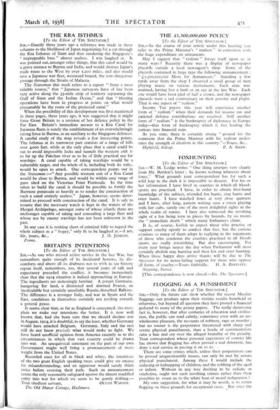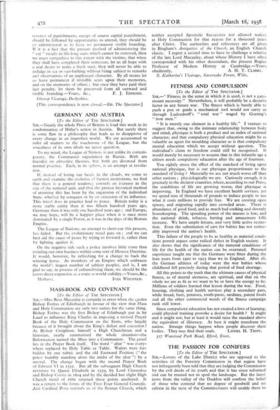FLOGGING AS A PUNISHMENT
[To the Editor of THE SPECTATOR.] SIR,—Only the future can show whether the recent Mayfair floggings can produce upon their victims results beneficial or otherwise, but beyond all question they have proved a financial godsend to many of the penny papers. The really distressing fact is, however, that after centuries of education and civilisa- tion, the public can read calmly, sometimes even with an un- wholesome pleasure, the accounts of robbery, rape or murder ; but no sooner is the perpetrator threatened with sharp and severe physical punishment, than a horde of sentimentalists raise a hue and cry over the alleged brutality of the penalty. Your correspondent whose personal experience of convict life has shown that flogging has often proved a real deterrent, has done a real service in passing it on to us.
There are some crimes which, unless their perpetrators can be proved unquestionably insane, can only be met by severe physical punishment. Among these I would include the seducing or kidnapping of children, and the robbing of the aged or infirm. Without in any way desiring to be sadistic or vindictive, ought not such revolting crimes rather than their penalties to rouse us to the white heat of moral indignation ?
My own suggestion, for what it may be worth, is to retain flogging on these grounds for exceptional cases. But since the severest of punishments, except of course capital punishment, should be followed by opportunities to amend, they should be so administered as to leave no permanent visible branding. If it is a fact that the present method of administering the " cat " results in life-long scars which cannot be removed, then we must sympathise to this extent with the victims, that when they shall have completed their sentences, let us all hope with a real desire to make a fresh start, they will never be able to indulge in sea or sun-bathing without being subject to remarks and observations of an unpleasant character. By all means let us leave permanent if invisible scars upon their memories, and on the memories of others ; but once they have paid their just penalty, let them be preserved from all outward and
visible branding.—Yours, &c., F. J. EDMOND. Glossop Vicarage, Derbyshire.
[This correspondence is now closed.—ED. The Spectator.]















































 Previous page
Previous page